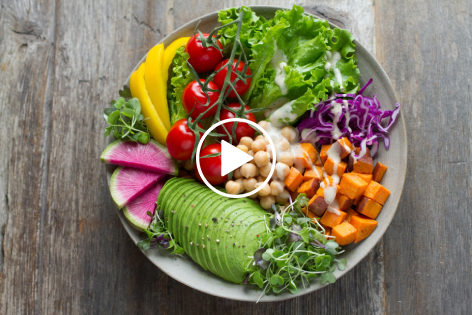
Boosting HDL Cholesterol: The Avocado Advantage and More
Source: American Journal of Clinical Nutrition (2018)
Lifestyle Medicine Update (January 5, 2022)
Introduction:
In the quest for heart health, we often hear about the importance of reducing LDL cholesterol—the notorious “bad cholesterol” that can clog arteries. Lowering LDL is undoubtedly crucial, but equally vital is increasing HDL cholesterol, the “good cholesterol” that acts as a cleanup crew for artery walls. In this article, we will explore how dietary and lifestyle changes can help raise HDL levels, with a special focus on the remarkable avocado.
The LDL Conundrum: A Common Concern
Over the years, many individuals have successfully improved their overall cholesterol profiles by adopting healthier dietary and lifestyle habits. These changes typically involve reducing the intake of saturated fats, trans-fats, deep-fried and pan-fried foods, as well as foods high in cholesterol. Lowering fasting blood sugar levels also plays a role in enhancing heart health. Engaging in endurance exercise and shedding excess body fat can further contribute to these improvements. In certain cases, medication may be necessary to bring LDL cholesterol into a safe range, ideally below 1.5 mmol/L (58 mg/dL).
HDL: The Unsung Hero
While much attention is given to lowering LDL, maintaining a high HDL cholesterol level is equally critical. HDL acts as a “vacuum cleaner” for cholesterol that has already nestled in artery walls. It helps reverse arterial blockages to some extent. The ideal target for HDL levels is at or above 1.6 mmol/L (60 mg/dL). However, here is the catch: the strategies that effectively lower LDL don’t always raise HDL, leaving some individuals with persistently low levels of this crucial cholesterol.
The Avocado Revelation
In 2018, the American Journal of Clinical Nutrition unveiled a promising revelation—a review of studies investigating the role of avocados in raising HDL cholesterol. The findings offered a glimmer of hope for those aiming to bolster their HDL levels. Out of the seven relevant studies conducted to date, avocado consumption was associated with a significant increase in HDL cholesterol—by 0.07 mmol/L (or 2.84 mg/dL). While this may not be a dramatic elevation, every bit counts. Notably, avocado consumption did not lower total cholesterol, LDL cholesterol, or blood sugar levels. Yet, the singular focus on raising HDL was an impressive feat.
Alternative Avenues to Boost HDL
While avocados have emerged as a heart-healthy option for raising HDL cholesterol, there are other well-established methods:
- Regular Endurance Exercise: Incorporating regular aerobic exercise into your routine can significantly boost HDL levels.
- Weight Management: Shedding excess weight, particularly around the waistline, is another effective strategy.
- Quitting Smoking: If you smoke, quitting can lead to an increase in HDL cholesterol, among numerous other health benefits.
- Extra Virgin Olive Oil: This heart-healthy oil enhances HDL’s efficiency in removing cholesterol from artery walls, although it may not directly raise HDL levels.
- Cashews: Consuming 30 grams (less than a ¼ cup) of cashews daily has been shown to slightly increase HDL levels and lower systolic blood pressure in individuals with type 2 diabetes.
Proceed with Caution
While some sources claim that fatty fish and omega-3 fats can elevate HDL levels, the evidence is mixed. If they do have an impact, it tends to be minimal. However, their other cardiovascular benefits make them valuable additions to a heart-healthy regimen in most cases.
The Challenge of Raising HDL
For some individuals, raising HDL cholesterol can be a challenging endeavor, possibly due to genetic factors. Nevertheless, making lifestyle changes such as reducing waist circumference, engaging in regular endurance exercise, quitting smoking, and incorporating avocado, cashews, and extra virgin olive oil into your diet can contribute to increased HDL levels.
In Conclusion: Prioritize Your Heart Health
As we conclude our exploration of HDL cholesterol and its significance, it is important to remember that heart health is a journey. Striking a balance between lowering LDL cholesterol and raising HDL cholesterol is key to achieving optimal cardiovascular health. The journey may involve making dietary choices that include avocadoes and other heart-healthy foods, along with adopting a physically active and smoke-free lifestyle. Ultimately, it is a path to a healthier heart and a longer, more vibrant life.
References
- Mahmassani HA et al. “Avocado consumption and risk factors for heart disease: a systematic review and meta-analysis.” Am J Clin Nutr, 2018; 107(4): 523-536 [Link](https://pubmed.ncbi.nlm.nih.gov/29635493/).
- WebMD: “HDL Cholesterol: the Good Cholesterol” (July 2020) [Link](https://www.webmd.com/cholesterol-management/guide/hdl-cholesterol-the-good-cholesterol).
- Helal O et al. “Extra-virgin olive oil consumption improves the capacity for HDL to mediate cholesterol efflux and increase ABCA1 and ABCG1 expression in human macrophages.” Br J Nutr, 2013; 109(10): 1844-1855 [Link](https://pubmed.ncbi.nlm.nih.gov/23051557/).
- Mohan V et al. “Cashew nut consumption increases HDL cholesterol and reduces systolic blood pressure in Asian Indians with type 2 diabetes: A 12-week randomized controlled trial.” 2018; 148(1): 63-69 [Link](https://pubmed.ncbi.nlm.nih.gov/29378038/).
- Neelakantan N et al. “The effect of coconut oil consumption on cardiovascular risk factors: A systematic review and meta-analysis of clinical trials.” J Circulation, 2020; 141: 803-814 [Link](https://www.ahajournals.org/doi/10.1161/CIRCULATIONAHA.119.043052).
- Abdelhamid AS et al. “Omega-3 fatty acids for the primary and secondary prevention of cardiovascular disease.” Cochrane Library, 2020 [Link](https://www.cochranelibrary.com/cdsr/doi/10.1002/14651858.CD003177.pub5/full).
Dr. Meschino

Dr. James Meschino
ABOUT THE AUTHOR
Dr. James Meschino, DC, MS, ROHP, is an educator, author, and researcher having lectured to thousands of healthcare professionals across North America. He holds a Master’s Degree in Science with specialties in human nutrition and biology and is recognized as an expert in the field of nutrition, anti-aging, fitness, and wellness as well as the author of numerous books.


